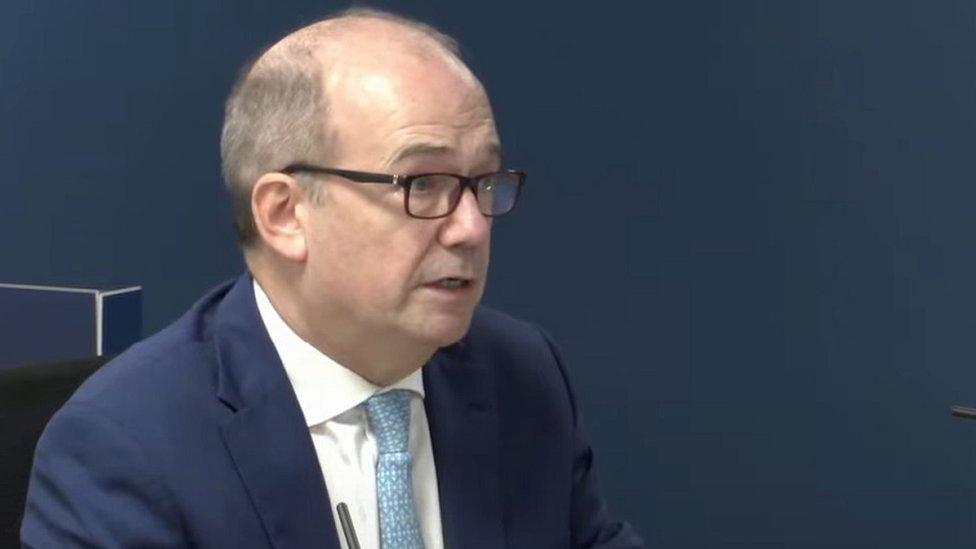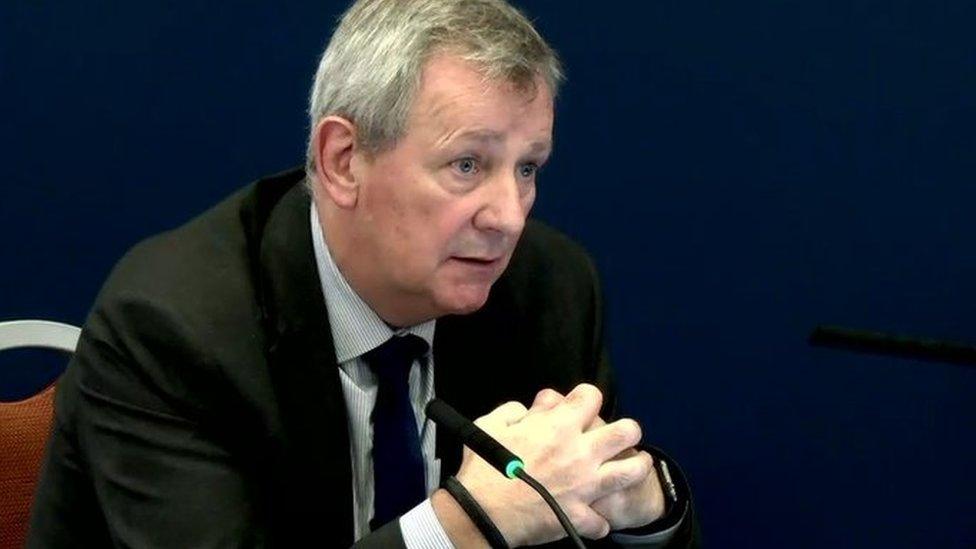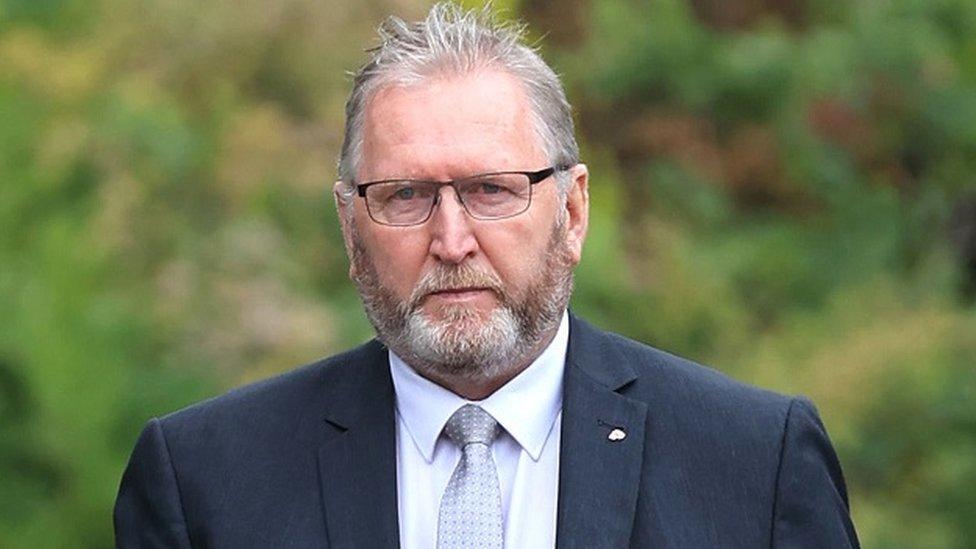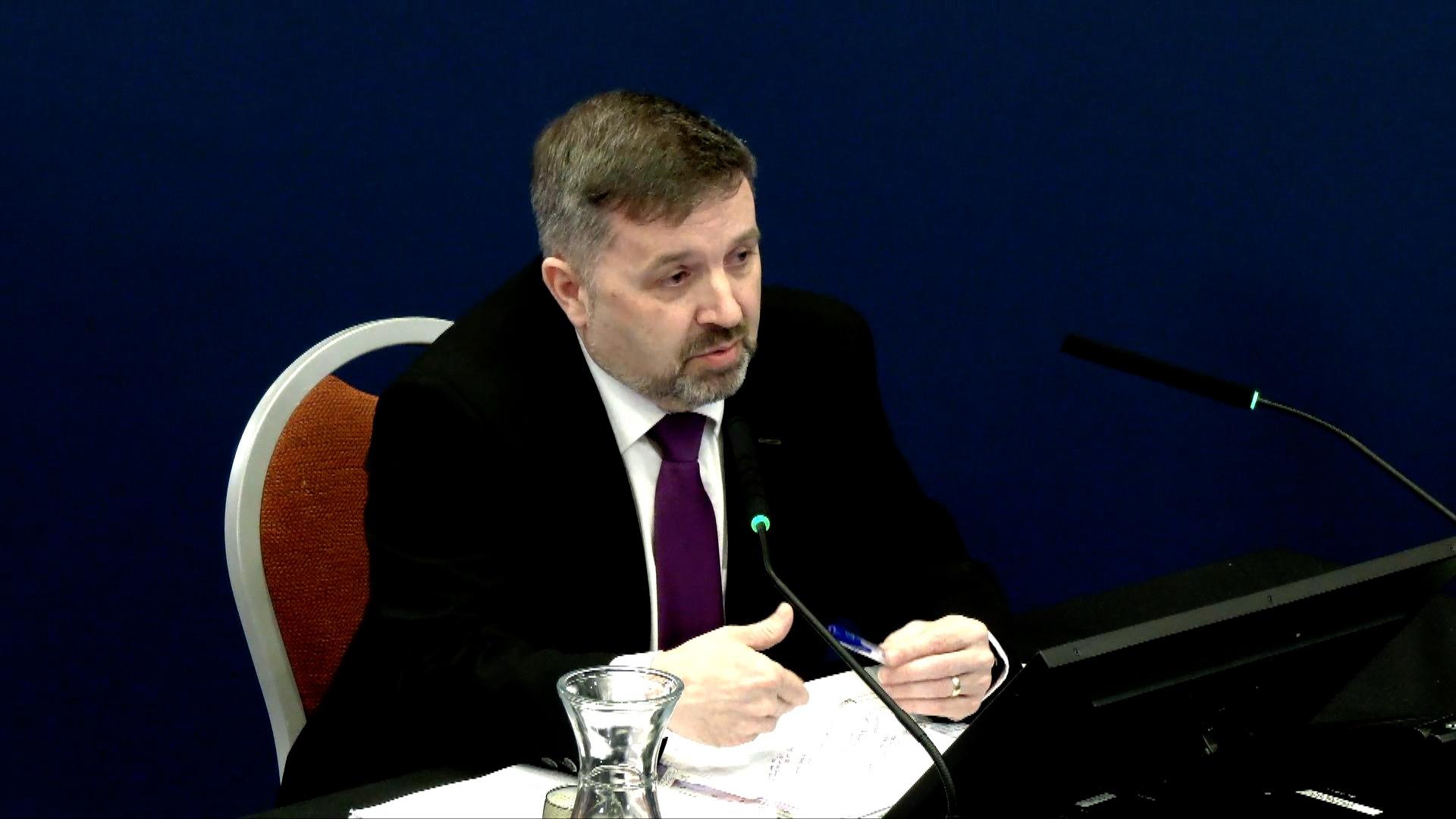Covid inquiry: Executive meetings to discuss lockdown my 'lowest days' - Swann
- Published
Robin Swann has been giving evidence to the UK Covid inquiry
Health Minister Robin Swann has said executive meetings in November 2020 on Covid rules were the "lowest days" he's ever experienced in politics.
He told the UK Covid-19 inquiry the behaviour at and leaking of the meetings in "live time" was wrong.
The meetings happened on 9-12 November 2020 when NI was experiencing a second surge in Covid cases.
Mr Swann criticised the DUP for deploying a cross-community vote to block some restrictions being extended.
He told the Covid inquiry: "From my time in politics there have been some highs and lows - but those four days were the lowest I've ever experienced in politics, in regards to the behaviour... and how those meetings were actually portrayed."
He said that while the deployment of a cross-community vote was a legal tool available to parties at the executive, he questioned whether it was "morally right".
It is a mechanism that can be deployed on any issue in the executive, if three or more ministers ask for a vote to be taken on that basis.
It was originally designed to protect minority rights, but effectively gives parties with enough ministers a veto.
"The fact I, as a unionist minister, was bringing forward a recommendation that was then subject to a vote by another unionist party steps outside the rationale as to what that mechanism was created for," said Mr Swann.
He said the period was particularly challenging and that it allowed people who were looking an excuse not to follow Covid rules a reason, as the executive was not "joined up".
He also told the inquiry that the attendance of senior Sinn Féin politicians at the controversial funeral of republican Bobby Storey in June 2020 meant the executive lost confidence of the public.
But he welcomed an acceptance from Sinn Féin MLA Carál Ní Chuilín that she should not have attended the funeral in her capacity as a minister.
Media leaks
Earlier Mr Swann told the inquiry the leaking of information from executive meetings during the Covid pandemic was "tolerated rather than challenged".
He said it was frustrating that information was often leaked "in real time" to the media.
He often felt it was a "deliberate" attempt to condition how the conversation about restrictions would go when the executive met, the minister said in evidence on Monday.
He said papers were often shared late with executive colleagues and would be leaked to the media, allowing a "narrative" to be established.
Covid Inquiry: CMO put in 'unfair' position over school closures, says Swann
He added there were various attempts to stop the leaking of information, which became "so endemic that it became tolerated rather than challenged".
"At times there was a live feed from the meetings, which left it extremely challenging at times for ministers to be open", Mr Swann said.
Inquiry chair Baroness Hallett asked him if banning electronic devices was ever discussed as an option, to which the minister responded that various attempts to stop leaking were made.
Mr Swann said there was one attempt at a leak inquiry undertaken by the then permanent secretary of the Department of Finance, Sue Gray.
He said he did not believe a finding ever came from that.
Mr Swann went on to describe how "opportunities were lost" during the pandemic as there had been no government in place for three years prior.
"Green sites could have been up and running to deal with cancer cases" while simultaneously dealing with Covid, he said.
He added that social care was reduced to a "Cinderella service" due to the mounting pressure on the healthcare system.
'Lonely and challenging'
The health minister said it was a "lonely and challenging position" as the sole Ulster Unionist minister in the executive during the pandemic.
Mr Swann was appointed health minister in January 2020 when power sharing at Stormont returned.
But he added that on recollection it was also a "strength" as he did not have to answer to party political colleagues.
He said that during the pandemic, he believed he did have support from other parties.
First Minister Michelle O'Neill is due to give evidence on Tuesday, with her former partner in the Executive Office, Baroness Foster, due to appear on Wednesday.
During the pandemic Ms O'Neill was deputy first minister from January 2020 until February 2022, while Baroness Foster was first minister from January 2020 until June 2021.
The inquiry is due to conclude sitting in Belfast on Thursday, when Sue Gray, who is now chief of staff to Sir Keir Starmer, is due to give evidence.
- Published10 May 2024

- Published7 May 2024

- Published2 May 2024

- Published13 May 2024
